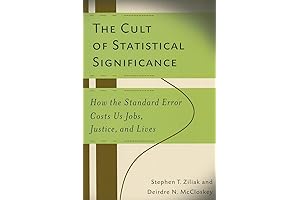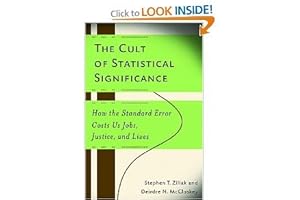· statistical significance · 5 min read
The Cult of Statistical Significance: A Must-Read for Understanding Data and Decision-Making
Uncover the flaws of statistical significance and its impact on our lives. Read our in-depth analysis of 'The Cult of Statistical Significance' by McCloskey.
In 'The Cult of Statistical Significance,' McCloskey challenges the over-reliance on statistical significance in various fields, arguing that it leads to flawed decision-making and distorted conclusions. This book is a must-read for anyone interested in understanding the role of data and statistics in our world.
Overview

PROS
- Debunks the uncritical use of statistical significance in various fields, revealing its limitations and potential for misleading interpretations.
- Provides a critical analysis of the 'cult of statistical significance' and its impact on decision-making in economics, justice, and public policy.
CONS
- Some readers may find the arguments challenging to follow, especially those without a background in statistics.
- The focus on statistical significance may overshadow other important aspects of data analysis and interpretation.
The Cult of Statistical Significance' challenges the blind adherence to statistical significance, a widely accepted practice in various disciplines. It exposes the limitations of relying solely on p-values and argues that this practice can lead to erroneous conclusions and poor decision-making. The book delves into real-world examples where the uncritical use of statistical significance has had detrimental effects, such as in economics, the justice system, and public health policy.
The author meticulously examines how the 'cult of statistical significance' has become ingrained in our thinking, leading to a distorted perception of the reliability and validity of research findings. Through compelling case studies and thought-provoking arguments, the book encourages readers to question the unquestioning acceptance of statistical significance and to embrace a more nuanced and critical approach to data analysis. By shedding light on the potential pitfalls of statistical significance, 'The Cult of Statistical Significance' empowers readers to make more informed decisions and to resist the allure of simplistic statistical claims.

PROS
- Critically examines how statistical significance is commonly misunderstood and misused in research and everyday life
- Offers a fresh perspective on the limitations and potential pitfalls of statistical analysis, empowering readers to think more critically
CONS
- Some readers may find the writing style dense and academic
- Examples and case studies are primarily drawn from academic settings, limiting the book's appeal to general readers
The Cult of Statistical Significance' by McCloskey challenges the overreliance on statistical significance testing in data analysis and interpretation. McCloskey argues that solely focusing on whether a result is statistically significant or not fails to consider other crucial factors such as context, effect size, and replicability. By highlighting the potential biases and misinterpretations that can arise from the cult-like following of statistical significance, the book encourages readers to adopt a more nuanced approach to data analysis.
Through numerous examples and case studies primarily drawn from academic research, McCloskey exposes the flaws in statistical reasoning and the subsequent distortions it can create. The book emphasizes the importance of considering the wider context and implications of statistical findings, as well as the need for replication to ensure reliability. While the academic focus limits its broader appeal, 'The Cult of Statistical Significance' is a timely and thought-provoking critique that encourages readers to approach data analysis more critically and ask the right questions.
The Cult of Statistical Significance' by McCloskey is a thought-provoking work that critiques the excessive reliance on statistical significance. McCloskey argues that this overemphasis has led to incorrect conclusions, wasted resources, and injustices in fields such as economics, criminal justice, and medicine. The book highlights the importance of considering context, uncertainty, and the real-world consequences of statistical decisions. Overall, 'The Cult of Statistical Significance' provides valuable insights into the limitations and responsible use of statistics.
Frequently Asked Questions
What is the main argument of 'The Cult of Statistical Significance'?
The main argument is that over-reliance on statistical significance can lead to flawed decision-making and distorted conclusions.
Who is the author of 'The Cult of Statistical Significance'?
The author is Deirdre McCloskey.
In which fields does McCloskey argue statistical significance is overused?
McCloskey argues that statistical significance is overused in fields such as economics, criminal justice, and medicine.
What is the importance of considering context and uncertainty in statistical decisions?
Considering context and uncertainty helps to avoid making overly simplistic or incorrect conclusions based on statistical data.
What are some of the consequences of overemphasizing statistical significance?
Some consequences include incorrect conclusions, wasted resources, and injustices in various fields.





